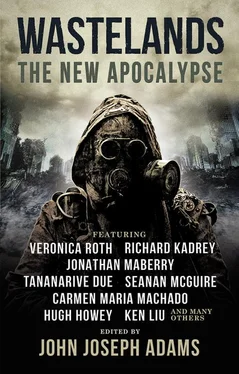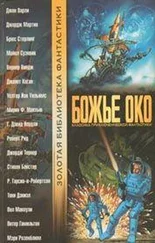“How have you survived, Mario?” he asked me.
“I do not know,” I said.
He pressed his thumb into the center of my forehead. “Wake up, Mario. Wake.”
I closed my eyes and opened them, and I was again in this room of humans, completely alone. A woman fell off her chair. The jack popped out of her neck and the room was awash in her moans.
I slumped back in my seat, my arms resting in my lap, the base of my skull cradled in a soft brace. I could twitch my fingers a little, and I found myself tapping out the rhythms I overheard on the leg of my pants: the cycles of rain that struck the roof and floor-to-ceiling windowpanes, the syncopated sound of human breath, even the uneven sounds from the woman who had fallen and could not stand. No one lifted from the chairs.
I remembered a howling storm that tore over the carnival in the weeks before the bird-men came. The rain drummed against the main tent, and we all sat and watched the structure around us inhale and exhale like it was alive, as if we were resting in the lungs of a giant beast. When I touched the leathery canvas and pulled my hand away, beads of water slid down my fingers. The whole place smelled like wet animals and hay, and human sweat. Celia, one of the acrobats, held me tightly against the bony arc of her ribcage, her heart banging around like a terrified bird, gently shush ing me even though it was really her own fears she was trying to soothe away. Thunder slit open the seams of the air. Lightning threw our faces into relief unevenly, like we were watching a badly joined filmstrip. The horses panicked and gouged nautilus-shaped curls of wood out of their stalls with their flailing hooves.
There, in the restaurant, Celia dead, Gilberto dead, the horses freed by the bird-men, a gust of wind blew an outdoor chair into the long glass window that faced the street. It went thickly veined with cracks, and then shattered. No one moved. Behind my fluttering lids, I saw the bird-men, again, the first time they came, how I wanted nothing more than to touch them, and how the tallest of them flinched away from my dry fingers. Then, darkness. Then, Gilberto’s hoarse laugh. Then silver knives. The carnival tents burning. A sheet-wrapped body thudding against the packed dirt of a shallow hole. Darkness again. I might have had a fever. I might have been there for two days, for fifty. The fallen woman’s moans of hunger went silent. Maybe it was only a few hours. I do not know. A deer—a full deer, not a splice—picked its way through the glass pieces, the room of people, curiously touching her black nose to us and to the terminals. Head dip, tap . A thin, gentle face so close I could see the high cheekbones, the liquid curve of her eyes. Stretched neck, tap . No fear. Tap. Tap .
* * *
Of course we all died, eventually. People’s credit ran dry, and anyway, the human body is not meant to have nutrients downloaded into it. Or uploaded. The mechanics of the machines were never clear to me, or anyone. As the last crop of humans failed, the splices said to us via the terminal screens, “We are sorry. This is part of the natural cycle. It was always supposed to happen this way. A normal flux. Evolution.” The message would scroll and then blink out, and then scroll again, over and over. I stopped reading it, after a while.
For those of us with enough credit—credit that was both useless and now saved us, though to what end?—we remained in the place we had last sat down, alive and aware, but motionless. In this way, we saw the cow-men and pig-men and bird-men, loosed of their need to pretend to be like us, return to nature. They shed their clothes and took to the outside world. As grass pressed up between blocks of pavement and trees split apart the streets and buildings, the splices lived there. They rollicked and pulled plants up with their teeth. They made sounds that may have been laughter. They reminded me, in the dim hallways of my memory, of the carnival freaks, the bearded woman who had trimmed my hair and slipped me butterscotch that I would click against my teeth, the melted man who had shown me how to throw a knife and pin a butterfly. The splices’ backwards knees allowed them to lollop thunderously across the earth like horses, but sometimes I saw them reading.
Those of us who were still alive did not fight what was coming. The footfall of our hearts did not quicken when green tendrils curled around us, grew into us, took what they needed. Where the soycorn and hydroponic lettucemelons had once grown, where we had built our cities, nature reclaimed her skin. She reached vines and microorganisms into the buildings and the houses and the land that had once sustained us. She reached into us .
Centuries hungry, she choked us down.
LAST CHANCE
NICOLE KORNHER-STACE
Nicole Kornher-Staceis the author of Desideria, The Winter Triptych , the Norton Award finalist Archivist Wasp , and its sequel, Latchkey . Her work appears in Clarkesworld, Apex , and Fantasy . She lives in New Paltz, NY. She can be found online at nicolekornherstace.comand on Twitter @wirewalking.
Mama was the very best torturer in all the Three Valleys. Everybody said so. Torturer means somebody who’s good at making you tell secrets, even when you don’t want to. It’s hard to lie to Mama. So I know she’s really good at her job.
Even the king up in Grayfall knew Mama was the best. He probably had his own torturer, because a king has everything, but who was it getting brought in the fancy cart all the way up the highroad whenever the king had a secret-keeper in his jail? You guess who.
I don’t know why Mama didn’t want to move to Grayfall. We spent so much time going back and forth, Sunrise to Grayfall along the highroad and back. The first time in the cart was okay, sitting on the soft seats with Mama, looking out the windows, playing I Spy and Count the Fires and Who Can Hold Their Breath the Longest, but on the way home it was already getting boring, and Mama said there’d be lots of next times after that, a job’s a job, so I better just get used to it.
Deep down I didn’t want to move to Grayfall either, not really. I liked it in Sunrise. Even if there was no king and no fancy cart and no kingsguard bringing me blackberry pastries from the castle kitchen while Mama was off working. In Sunrise we had our very own house, just me and Mama, with our very own mint plant and our very own tree, with a swing on the low branch that’s the perfect height for me and I didn’t have to share it with anyone.
But the best part about Sunrise was the giants. Sometimes for Mama’s work she puts a secret-keeper’s feet into a box of stones and makes them stand in the river with just their face sticking out until they tell her all the secrets the king wants to know. These two giants have their feet stuck in the earth pretty much exactly like that, their heads tilted back in just the same way, the Waste drifting up around their ankles like snow. The rest of their bodies are rusty like an old knife and you can’t really tell what they used to look like, but I like how the highroad to Sunrise runs between them and you can look up and imagine that they were in the middle of play-fighting like me and Jamie sometimes do when our chores are done and somebody said FREEZE and so they froze there, one of them grabbing the other one’s fists in midair.
Jamie’s dad says the giants are old old magic. Older than any house in Sunrise. Older than the castle in Grayfall. Older than the highroad, which is so old it’s mostly gone in places and workers have to go out with flat rocks to patch up the places where the road disappears and it’s just Waste where the road should be. Older even than the Grayfall songkeeper, who’s so old her face looks like a dried apple with no juice left in it at all.
Читать дальше


![Nick Cracknell - The Quiet Apocalypse [= Island Zero]](/books/28041/nick-cracknell-the-quiet-apocalypse-island-zero-thumb.webp)









